Introduction to Outpatient Treatment Programs
Outpatient treatment programs are a cornerstone of modern mental health and addiction recovery, providing flexible, community-based care for individuals seeking to manage their conditions without the need for overnight hospitalization. These programs accommodate diverse needs, from mild to moderate substance use disorders and mental health issues, and serve as both a step-down from inpatient care and a primary treatment modality. This article explores what outpatient treatment programs entail, how they operate, their benefits, different types, and how to access these essential services.
Defining Outpatient Treatment Programs and Their Purpose
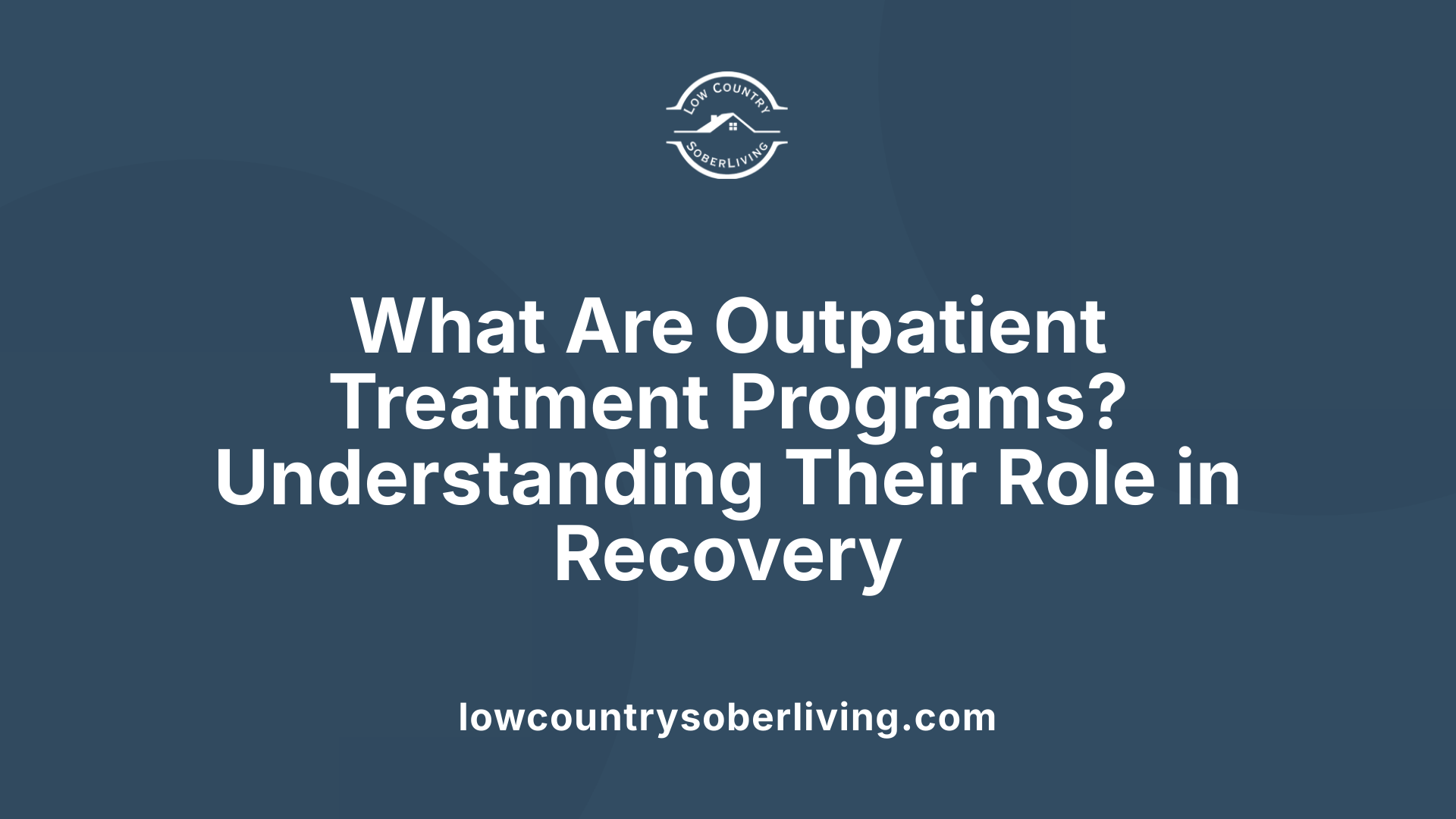
What is an outpatient treatment program?
An outpatient treatment program is a healthcare service tailored to individuals suffering from mental health or substance use disorders who do not require overnight hospitalization. These programs include scheduled sessions such as individual therapy, group counseling, family meetings, medication management, and educational workshops that are held at clinics or community health centers.
One of the defining features of outpatient programs is that individuals can live at home, continue working, attending school, or managing family responsibilities. This flexible arrangement allows patients to receive consistent care without disrupting their daily routines, which is especially beneficial for those with mild to moderate conditions or for those transitioning from inpatient care.
Goals of outpatient programs
The primary objectives of outpatient treatment are to promote long-term recovery, reduce the risk of relapse, and support individuals in returning to their community life after treatment. Outpatient programs aim to address the complex needs of patients through personalized care plans that might include psychotherapy, medication, and support groups.
These programs focus on addressing the root causes of substance use and mental health issues, fostering coping skills, teaching relapse prevention strategies, and enhancing social support networks. For individuals with co-occurring mental health and substance use disorders, specialized outpatient services ensure comprehensive treatment that addresses both conditions simultaneously.
Main differences from inpatient care
Compared to inpatient treatment, outpatient programs do not require residence at a healthcare facility. Inpatient care provides 24-hour supervision, intensive medical management, and is generally reserved for severe cases involving significant detoxification needs or high risk of complications.
Outpatient care offers a less restrictive environment with scheduled sessions usually a few hours per day, several days a week. This structure supports ongoing responsibilities such as employment and family commitments. While inpatient programs are suitable for severe cases requiring immediate and intensive care, outpatient programs are ideal for stabilizing patients and supporting ongoing recovery when their condition is manageable outside a hospital setting.
| Aspect | Inpatient Care | Outpatient Care | Additional Details |
|---|---|---|---|
| Living Arrangement | Resides at facility | Lives at home | Flexibility varies |
| Treatment Intensity | 24-hour supervision | Scheduled sessions | Inpatient offers intensive management, outpatient offers flexible, ongoing support |
| Duration | Several weeks to months | Weeks to years | Treatment length varies depending on individual needs |
| Suitable For | Severe addiction or mental health crises | Mild to moderate conditions | Selection depends on severity, support system, and medical stability |
| Cost | Higher | Lower | Cost benefits for outpatient care due to reduced housing and supervision needs |
This contrast underscores the importance of selecting the appropriate treatment setting based on individual circumstances and medical advice. Outpatient programs are an effective part of the continuum of care, especially for those who have achieved initial stabilization but need ongoing support to maintain sobriety and mental health.
How Outpatient Programs Function and Their Therapeutic Components
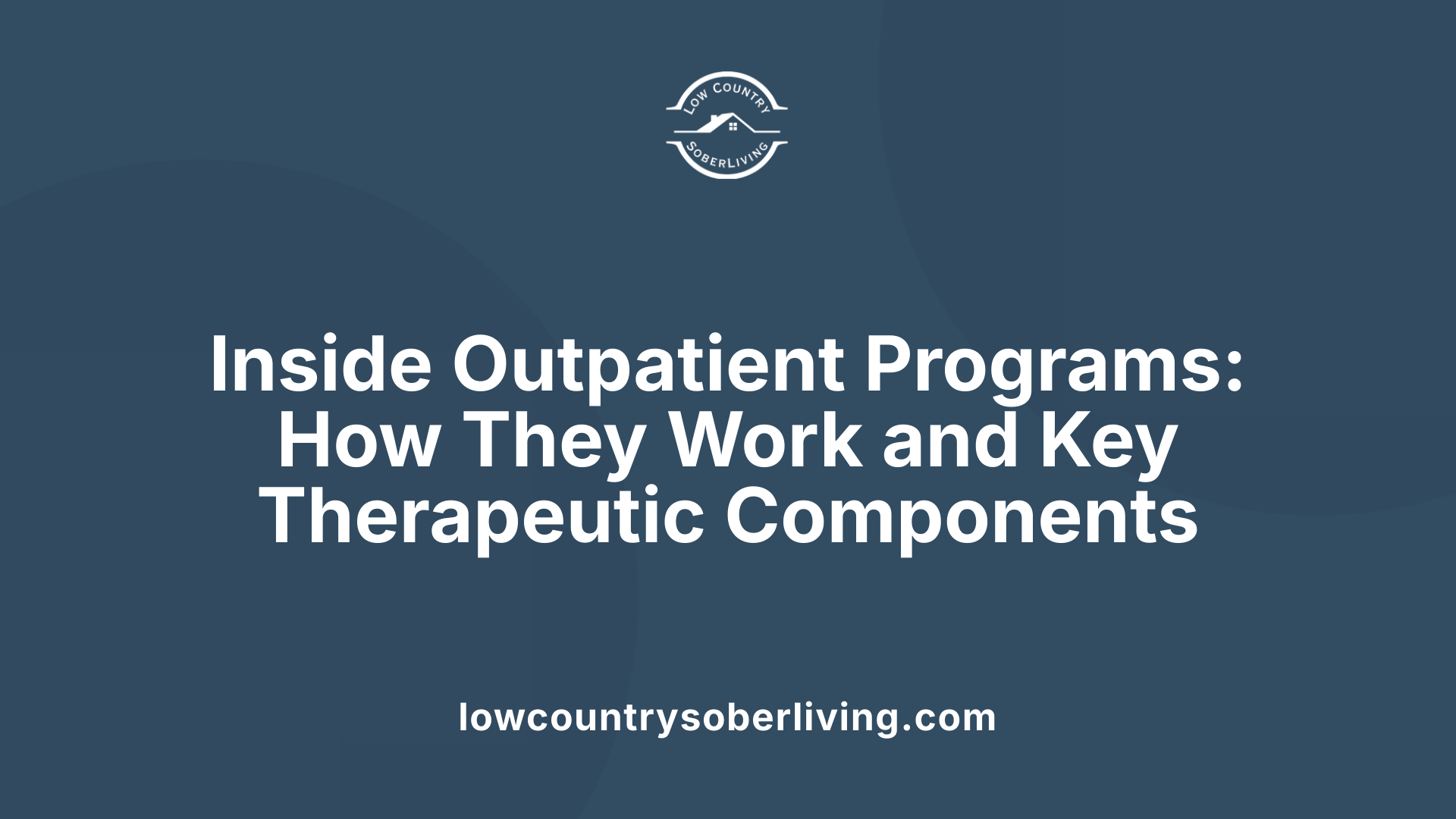
How do outpatient treatment programs work?
Outpatient treatment programs operate by scheduling regular therapy sessions and clinical services that support individuals in their recovery journey, all while allowing them to maintain their daily routines at home. These programs are designed to be flexible in structure, providing an array of options tailored to varying levels of severity and individual needs. The most common forms include Partial Hospitalization Programs (PHP), Intensive Outpatient Programs (IOP), and standard outpatient services.
Participants in these programs attend scheduled sessions usually several times a week. For example, PHP offers around 20 hours of treatment per week, including medical oversight, therapy, and education. IOP typically involves about 9 hours of therapy weekly, split into multiple sessions such as three 3-hour group meetings. The goal is to foster behavioral change, relapse prevention, and skills development.
Patients live at home, work, or attend school while actively participating in treatment. This setup supports a real-world approach, giving individuals the ability to practice new skills in everyday life while receiving ongoing professional guidance. Medical and mental health professionals monitor progress closely, often incorporating medication management when appropriate.
One critical component is that outpatient programs serve as a continuum of care, often following inpatient treatment, but they can also act as a primary treatment for those with less severe addiction. This flexible and accessible approach makes outpatient care a popular choice for many seeking long-term recovery.
Typical components and services
Outpatient programs offer a comprehensive suite of services aimed at addressing the multifaceted nature of substance use and mental health conditions.
- Individual Counseling: One-on-one sessions with therapists focus on personal challenges, coping skills, and emotional health.
- Group Therapy: Facilitates peer support, shared experiences, and skill-building in a supportive environment.
- Family Involvement: Family therapy sessions and education support recovery within the family system, strengthen communication, and help address relational dynamics.
- Medication Management: Certain medications, such as methadone, buprenorphine, or naltrexone, are prescribed and monitored to assist with dependence and cravings.
- Psychoeducation: Informative sessions aim to enhance understanding of addiction, mental health issues, and relapse prevention.
- Relapse Prevention and Life Skills Training: Programs teach coping strategies, stress management, and skills for handling triggers.
- Holistic and Supportive Services: Some programs include wellness activities like mindfulness, yoga, nutrition counseling, vocational support, and recreational therapy.
These services are often integrated into individualized treatment plans, which are regularly reviewed and adjusted based on patient progress.
Therapies and support services involved
A variety of therapeutic modalities are employed within outpatient programs to meet the diverse needs of clients.
| Therapy Type | Description | Additional Support |
|---|---|---|
| Cognitive-Behavioral Therapy (CBT) | Focuses on changing negative thought patterns and behaviors | Commonly used for relapse prevention |
| Dialectical Behavior Therapy (DBT) | Addresses emotional regulation and interpersonal effectiveness | Especially effective for co-occurring mental health issues |
| Motivational Interviewing (MI) | Enhances motivation to change through guided conversation | Useful in initial recovery stages |
| Group Therapy | Peer-led or therapist-led sessions | Builds community and shared understanding |
| Family Therapy | Engages family members in the recovery process | Improves communication and support |
| Medications | Supports abstinence and reduces cravings | Includes FDA-approved drugs like buprenorphine and methadone |
| Psychoeducation | Provides knowledge about addiction and mental health | Empowers clients with self-management skills |
| Holistic Approaches | Integrates mindfulness, yoga, art therapy | Promotes overall well-being |
These diverse therapies create a comprehensive approach, addressing both physical and psychological aspects of addiction.
| Outpatient Program Components and Services | Therapies Used | Support Services |
|---|---|---|
| Individual Counseling | CBT, MI, supportive counseling | Case management, crisis support |
| Group Therapy | Process groups, skills training | Peer support groups |
| Family Sessions | Systemic therapy techniques | Family education or support groups |
| Medication Management | Pharmacotherapy | Medication-assisted treatment (MAT) |
| Psychoeducation | Condition education | Wellness and lifestyle programs |
| Holistic & Recreational | Mindfulness, yoga, art therapy | Community and vocational support |
Overall, outpatient programs provide flexible, integrated, and personalized treatment modalities designed to promote recovery, sustain mental health, and improve quality of life for individuals coping with substance use and co-occurring disorders.
Types and Duration of Outpatient Treatment Programs
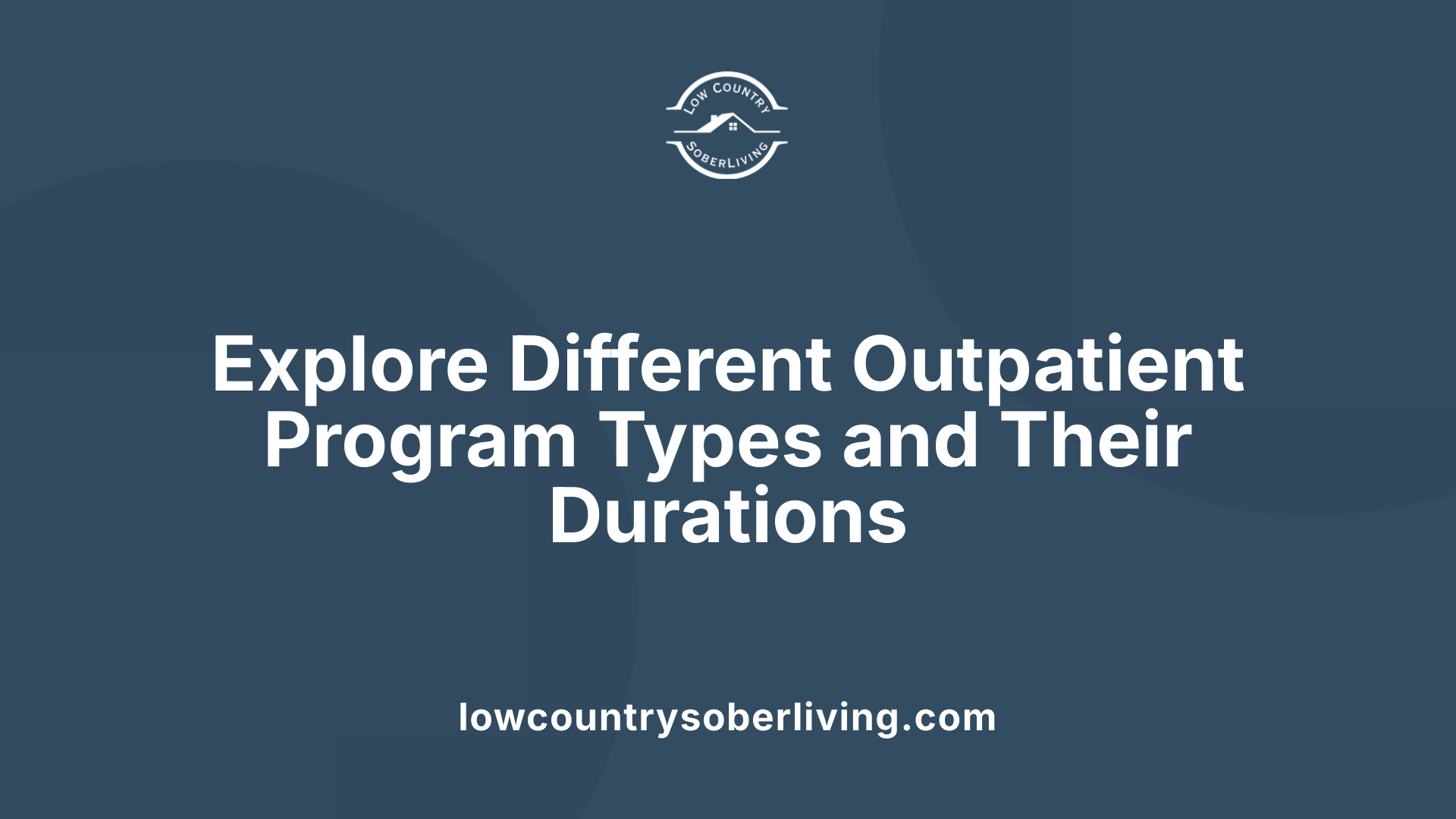
What are the types of outpatient treatment programs?
Outpatient treatment programs provide flexible, community-based care for individuals seeking help with substance use or mental health disorders. These programs are designed for patients who do not require overnight hospital stays and can manage their daily routines while receiving treatment.
The main types include standard outpatient therapy, intensive outpatient programs (IOPs), and partial hospitalization programs (PHPs).
- Standard Outpatient Therapy involves weekly or bi-weekly sessions, typically focusing on individual and group counseling, education, and support. It is suitable for mild to moderate conditions and helps sustain recovery.
- Intensive Outpatient Programs (IOPs) usually involve at least nine hours of treatment per week, spread over several days, often including group therapy, counseling, and relapse prevention strategies. They are more structured and often serve as a step between inpatient care and regular outpatient therapy.
- Partial Hospitalization Programs (PHPs) provide a higher level of care, with several hours of treatment daily, operating as a bridge for those transitioning from inpatient care. They often involve medical oversight, therapy, and skill-building activities.
Additional services like outpatient mental health care, medication management, peer support groups, and telehealth options further enhance accessibility and personalization of treatment. These various formats accommodate different levels of severity and individual needs, making outpatient treatment a versatile component of the recovery process.
How long does outpatient treatment usually last?
The length of outpatient treatment varies significantly based on an individual's needs, progress, and the specific program. Typical durations include:
- Short-term programs last approximately 45 to 60 days, suitable for mild cases or as follow-up after inpatient treatment.
- Standard outpatient programs often run about 90 days, adding an extended period for stabilization and relapse prevention.
- Intensive outpatient programs (IOPs) generally require a commitment of at least 3 to 4 months, with therapy sessions occurring 3 to 5 days per week.
- Long-term outpatient support can extend for several months or even years, especially for individuals dealing with complex or co-occurring mental health issues.
The duration depends on factors like the severity of the condition, response to treatment, and personal circumstances. Some individuals may transition from intensive outpatient to less frequent therapy sessions, gradually tapering as they build resilience and coping skills.
What criteria determine eligibility for outpatient treatment?
Eligibility for outpatient services hinges on clinical assessment and practical considerations. Healthcare providers evaluate several criteria to determine if outpatient treatment is suitable:
- Diagnosis and severity: The individual must have a diagnosed mental health or substance use disorder that does not require immediate inpatient or residential care.
- Stability and safety: Patients should have a stable living environment, no immediate risk of harm to themselves or others, and a history of manageable episodes.
- Motivation and compliance: Willingness to actively participate in therapy, family involvement, and adherence to treatment schedules are crucial.
- Support system: A reliable support network at home or in the community can enhance treatment success.
- Medical appropriateness: The individual’s medical and psychological assessments should indicate that outpatient care can meet their needs effectively.
Generally, candidates for outpatient treatment are those with mild to moderate conditions, strong support systems, and the ability to maintain daily responsibilities like work or school. Healthcare professionals tailor eligibility assessments to ensure safety and maximize the effectiveness of outpatient care.
| Program Type | Typical Duration | Intensity & Description | Suitable For |
|---|---|---|---|
| Standard Outpatient | Several weeks to months | 1-2 sessions a week, focus on counseling and education | Mild to moderate cases |
| Intensive Outpatient (IOPs) | 3-4 months; 9+ hours/week | Multiple days, structured group and individual therapy | Moderate cases, stepping down from inpatient |
| Partial Hospitalization Programs (PHPs) | Several hours daily; several weeks | Most intensive outpatient care, medical oversight | Severe cases, need for constant monitoring |
This table summarizes the various outpatient options, their typical durations, and suitability to different patient needs, illustrating outpatient treatment’s flexibility and tailored approach.
Effectiveness and Evidence Supporting Outpatient Treatment
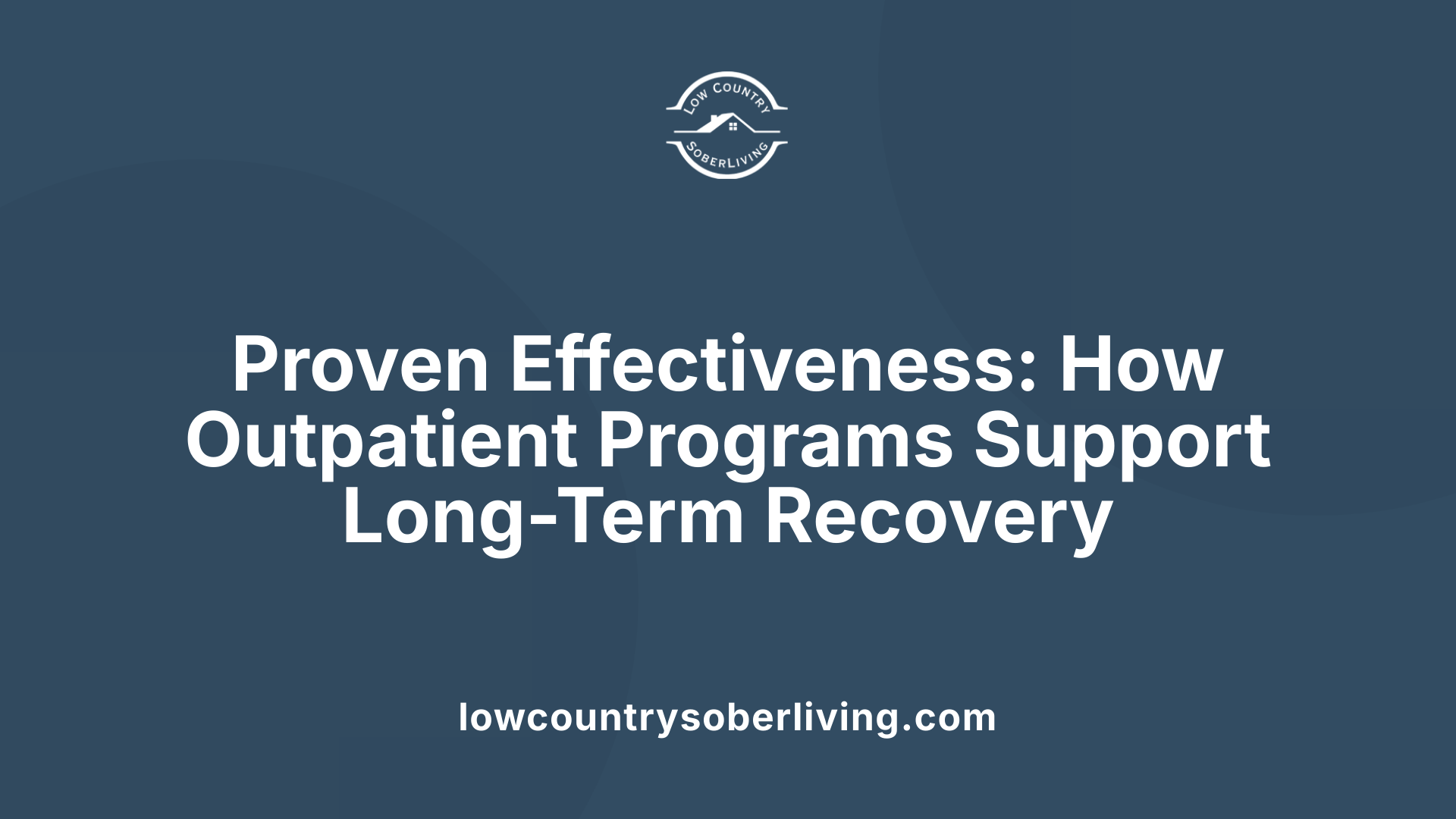
Is outpatient treatment effective?
Research shows that outpatient treatment can be very effective for many individuals, especially when it incorporates evidence-based practices like family therapy, cognitive-behavioral therapy (CBT), and motivational interviewing. For substance use disorders, intensive outpatient programs (IOPs) have been proven to yield outcomes similar to inpatient programs.
Studies indicate that IOP participants experience significant reductions in substance use, with many achieving sustained abstinence. They also show improvements in mental health, coping skills, and overall functioning. This makes IOPs a flexible and effective option for those who do not need around-the-clock supervision.
While inpatient and residential treatments are often necessary for severe cases, the evidence supporting outpatient care’s effectiveness is robust, especially for moderate conditions. Outpatient programs facilitate integration into the community, allowing individuals to apply new skills in real-world settings while maintaining daily responsibilities.
Overall, the success of outpatient treatment depends on the use of evidence-based approaches, personalized care plans, and active support networks that help individuals stay engaged and motivated for recovery.
Accessing Outpatient Services and Role in Long-Term Recovery
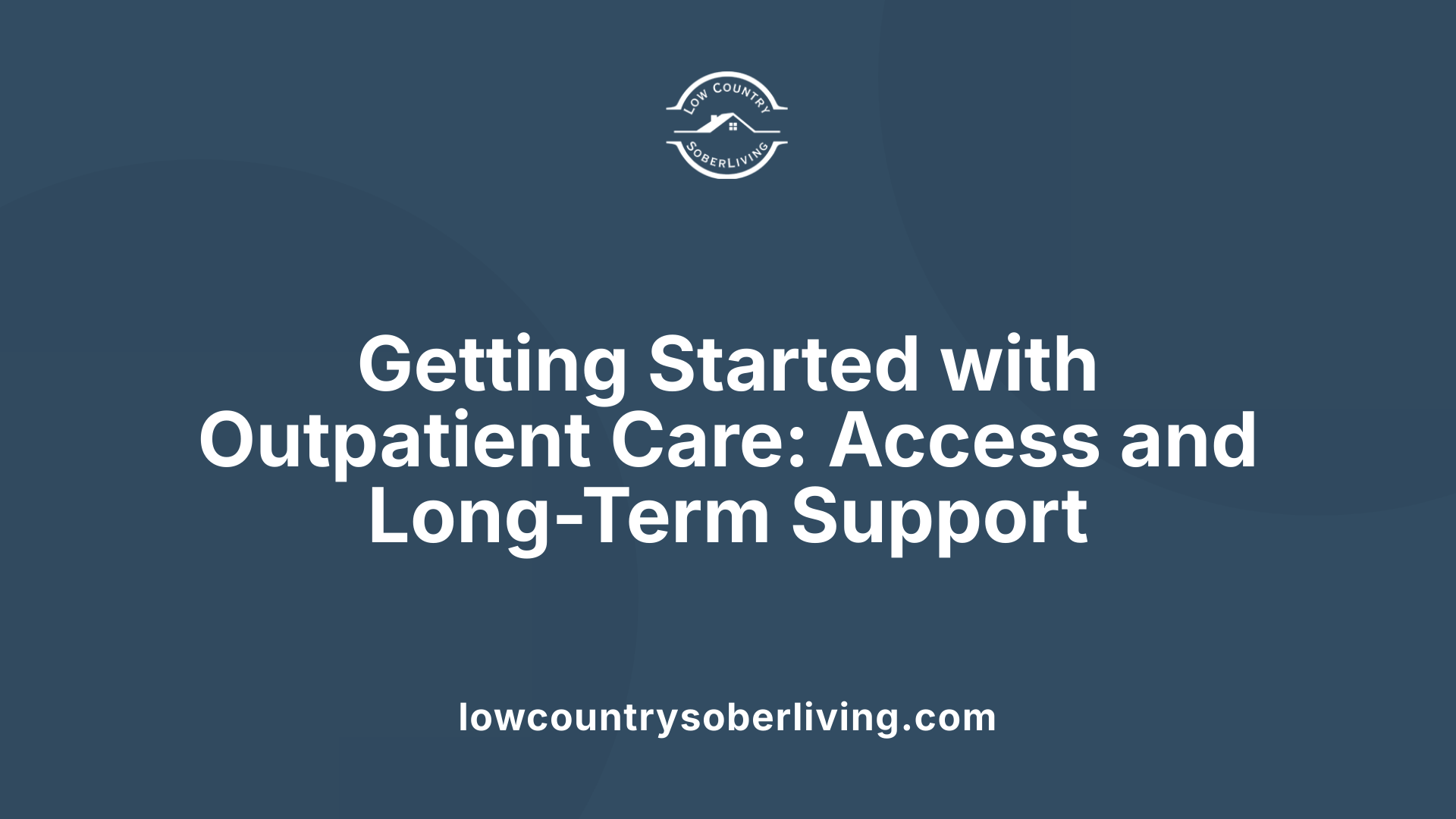
How can someone access outpatient treatment services?
Getting started with outpatient treatment involves several straightforward steps. Individuals can use official resources like FindTreatment.gov, a website that helps locate licensed outpatient programs across regions. This service simplifies the process by providing comprehensive listings and contact information for available facilities.
Referrals from healthcare providers, mental health specialists, or local health authorities also facilitate access. Many states have Outreach, Screening, Assessment, Referral (OSAR) services that connect individuals with appropriate outpatient options. These services help evaluate needs and guide patients toward suitable treatments.
Insurance coverage, including Medicare and Medicaid, often covers outpatient programs, making these services more affordable. Insurance details vary, so checking with providers helps clarify coverage for therapy, counseling, and community-based support.
Potential patients can contact treatment facilities directly to schedule assessments or initial consultations. In emergencies, helplines like the 988 Suicide & Crisis Lifeline offer immediate support and can assist in navigating options for outpatient care.
Overall, there are multiple pathways—online searches, professional referrals, insurance and helpline support—to connect individuals with appropriate outpatient mental health and addiction treatments.
What is the role of outpatient programs in recovery?
Outpatient programs serve as a vital part of the recovery journey, offering flexible and continuous support tailored to each person’s circumstances. They are designed to accommodate various recovery stages and severity levels, including Partial Hospitalization Programs (PHP), Intensive Outpatient Programs (IOP), and standard outpatient therapy.
These programs provide a broad spectrum of services such as individual and group therapy sessions, family involvement, medication-assisted treatment, and relapse prevention strategies. They often incorporate evidence-based approaches like Cognitive Behavioral Therapy (CBT), Dialectical Behavior Therapy (DBT), and Twelve Step facilitation.
One significant advantage of outpatient care is that it allows individuals to live at home and maintain employment, school commitments, and family responsibilities. This ongoing engagement with health professionals supports continuity in care, which is crucial for long-term recovery.
Research indicates that outpatient programs are highly effective, especially when integrated with community resources and ongoing support networks. They help reduce substance use, improve mental health, and foster skills for managing triggers and stress.
In summary, outpatient treatment facilitates sustained recovery, promotes relapse prevention, and enhances overall mental health stability by bridging professional support and daily life.
How do outpatient programs support recovery and mental health management?
Outpatient programs function as a cornerstone for maintaining long-term recovery and mental well-being. They support individuals through a flexible schedule that adapts to their personal and professional lives, encouraging consistent engagement with recovery activities.
These programs are structured to provide comprehensive therapeutic interventions, including individual counseling, group therapy, family sessions, psychoeducation, and sometimes medication management. The variety of therapies helps address the multifaceted nature of addiction and mental health disorders.
A key aspect of outpatient programs is their focus on relapse prevention, teaching coping skills and life skills that empower individuals to handle stress and triggers effectively. They foster an environment of ongoing support, often through community organizations, peer groups, and alumni networks.
Medication-assisted treatments like buprenorphine or naltrexone are frequently integrated to support recovery from opioid or alcohol dependence. This combination of therapy and medication enhances treatment effectiveness.
Inclusive of family involvement and cultural considerations, outpatient programs aim to create a personalized path to wellness. They emphasize flexibility, allowing patients to continue their routines while making meaningful progress.
Overall, outpatient services help individuals develop stability, resilience, and independence, making long-term management of mental health and addiction both achievable and sustainable.
Conclusion: The Vital Role of Outpatient Treatment
Outpatient treatment programs are an integral part of the continuum of care for mental health and substance use disorders. They offer a flexible, effective, and accessible option for individuals seeking recovery while maintaining their daily routines. With evidence supporting their efficacy, varied levels of care, and comprehensive services, outpatient programs help individuals achieve sustained sobriety and mental stability. Whether as a step-down after inpatient care or as a primary treatment modality, outpatient programs serve as a vital resource that fosters long-term health, community connection, and personal empowerment. Continued advancements and increased access to outpatient treatment are essential for addressing the diverse needs of individuals in recovery.
References
- National Helpline for Mental Health, Drug, Alcohol Issues - SAMHSA
- Substance Abuse Intensive Outpatient Programs: Assessing the ...
- Veteran and VA Outpatient Rehab for Substance Abuse Treatment
- Inpatient and Outpatient Treatment for Substance Use Disorder
- Substance Use Disorder Outpatient Treatment Program
- Outpatient Rehab for Drugs & Alcohol Near You
- Types of Treatment | Office of Addiction Services and Supports

